What if we reimagine all of the significant historical figures in Science, Technology, Engineering, and Mathematics as superheroes?
The significant personalities of these fields are our real-life epic heroes. For Jason Jones, creator of STEM: Epic Heroes, this was true. However, in early spring 2015, he realized that this was not the case for his son. While playing a game of the Pokémon CCG, Jones was talking to his son about Alexander Fleming (winner of the Nobel Prize for his discovery of penicillin). During that conversation, Jones said to his son, “He’s one of the giants…one of the epic heroes of science.” In reply, his son said, “But daddy, scientists aren’t heroes.” You can read the rest of the origin story for STEM: Epic Heroes HERE, but in short this exchange with his son is what set Jones on the mission to create a CCG of STEM Heroes that displayed Scientists, Technologists, Engineers, and Mathematicians as the epic heroes they indeed are.
Overview
STEM: Epic Heroes is a family friendly competitive set collection game with Take That elements. It is a lightweight, fast-paced, game that can be taught quickly to new players. The game is bright, with outstanding art by a team directed by Aaron Hanna and including artists: Maria Poliakova, Ilya Bondarenko, George Doutsiopoulos, Limetown Studios, Javier Salas, Tim Kaminski, Joe Wilson, and Sarah Hanna.

The game contains two decks: Hero Deck (which includes Heroes, Items, Location, and Inspirations) & Discovery Deck (which includes the Discovery Steps).
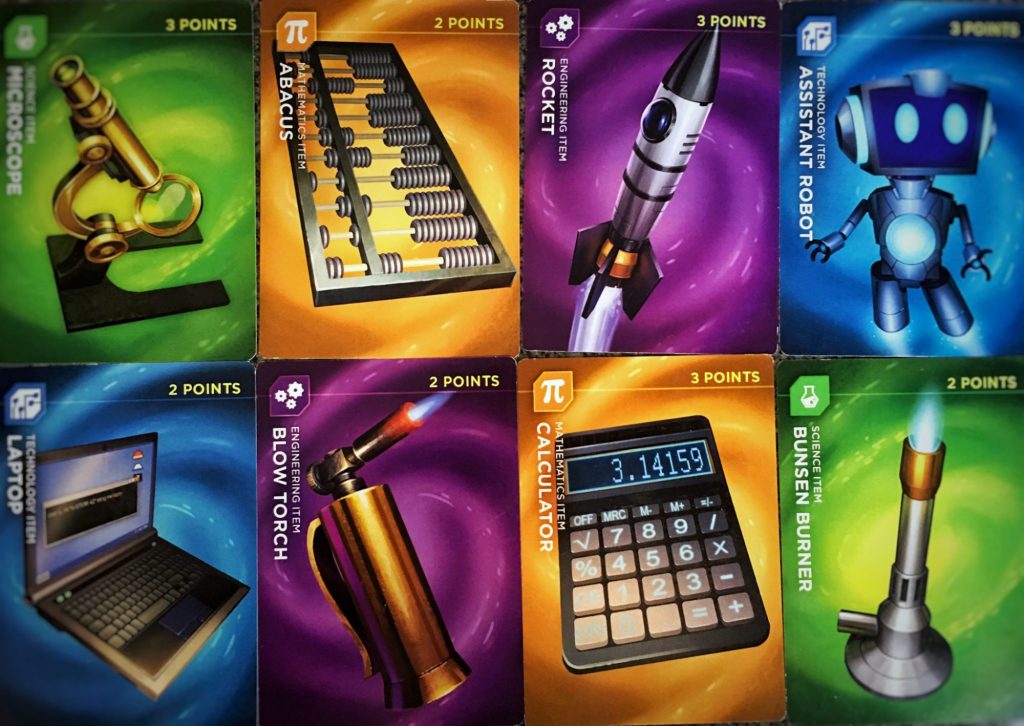
Gameplay
In STEM: Epic Heroes your goal is to collect five scientific Discovery Steps (representing the steps of the scientific method) with your team of STEM heroes before your opponents. You can enhance your score with Items and Locations, and along the way, you will leverage Inspiration Cards to both accelerate your progress and disrupt your opponents. At the start of the game, each player is dealt a hand of six cards from the Hero Deck. Then five Discovery Cards are dealt in a line in the center of the table from the Discovery Deck.

On your turn, you play an Epic Hero from your hand to acquire a Discovery Step card. The Hero you play must match the Discovery’s type (Science, Technology, Engineering, Mathematics), depicted by color (Green, Blue, Purple, Gold) and icon. Polymath Heroes are wild and can acquire all Discovery Step types. Each Hero comes armed with a unique ability, and through these abilities, you can gain an advantage. The Hero abilities are also thematic. For example, Albert Einstein’s ability is “Theory of Relativity,” which lets him score a Discovery Step at any time, even when not his turn or Nikola Tesla’s ability “Alternating Current” which deducts his enhancement score from the opponent with the highest final score. The enhancement score comes from Item and Location cards which may be added to increase the point value of discoveries.
Throughout the game, even if it is not your turn, Inspiration Cards can be played to alter the game instantly. The Inspiration Cards add the Take That element which increases the excitement of the game. Inspiration Cards can also be used to accelerate your progress, disrupt your opponents, or protect you from their Inspiration Cards.
The game ends when one player completes all five steps of the scientific method to make their discovery. All players count their points, and the player with the most earned points wins! The gameplay is quick and straightforward to teach while the hero special abilities and Inspiration Cards add some light strategy that keeps gameplay exciting and dynamic.
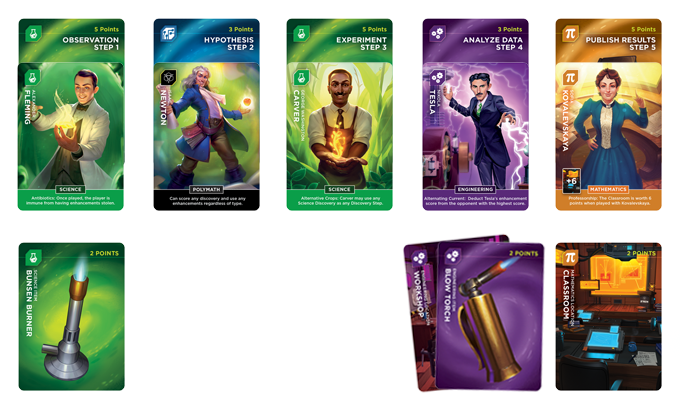
What I Like About STEM: Epic Heroes
Let’s start with the obvious, ART! The art is colorful and vivacious. The display of the Scientists, Technologists, Engineers, and Mathematicians found on these cards as Epic heroes are genuine. This design team has created superheroes out of those people who have contributed significantly to our humanity. This cast of heroes is diverse too, including many lesser-known STEM men and women from across the world (such as Al-Khwarizmi, Werner Von Braun, Chen-Shiung Wu, Zhang Heng, Sofia Kovalevskaya, and Alice Ball).
In addition to the game, thanks to stretch goals of the Kickstarter, backers will also receive digital prints of some of the hero portraits. The reward now also includes an expanded rule booklet that provides hero art, and at the $40K mark during the campaign, it was announced that a companion STEM: Epic Heroes reference website would launch! This site will be a compendium of the cards in the game and include extended hero bios, gameplay tips, and links to reference sources.
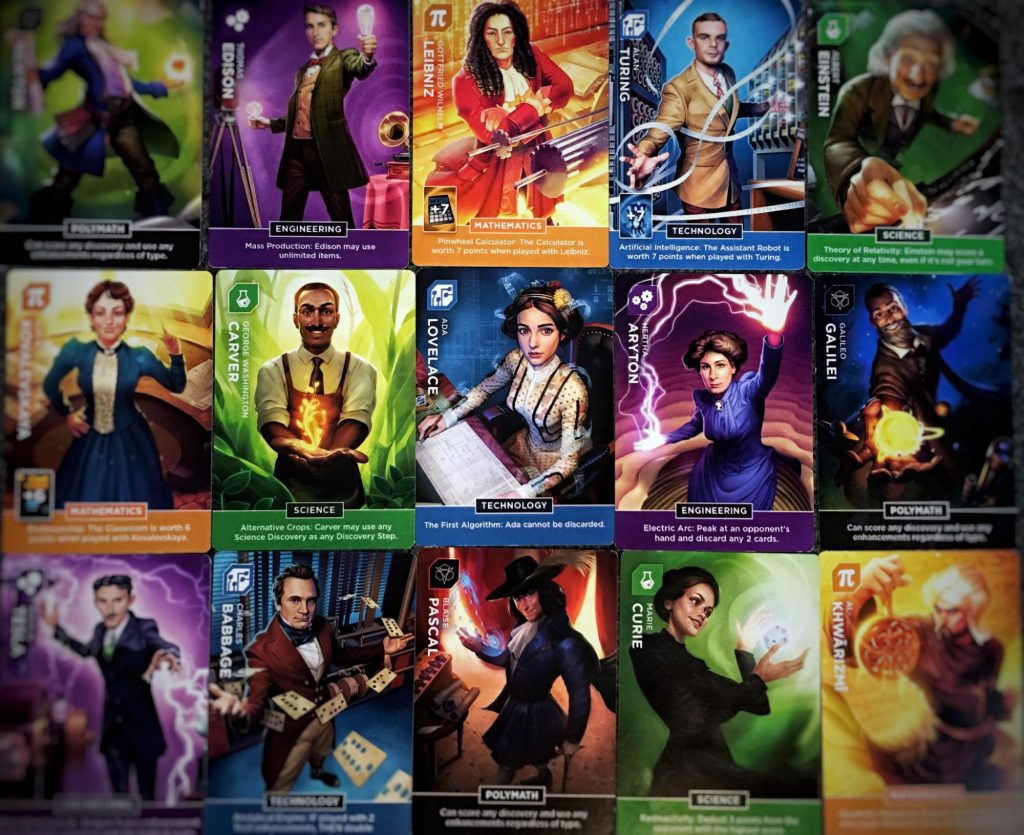
There is more to like here than just the art. I should make clear up front that this game is light. However, there is enough depth provided by the hero abilities and Take That elements to consider this game lightly strategic. It’s super easy to teach, the concepts here are simple. It’s fast, playing in less than 30 min; 15 with two. With only two decks of cards, it’s portable, and easy to play most places, taking up very little table space.
What I Dislike About STEM: Epic Heroes
It’s light; I mentioned that. I enjoy a quick light game, and this game is an excellent addition to that genre. One downside I have recognized with this game is a slight dependence on the right players. As mentioned previously this game has Take That elements. In my opinion, it is these Take That aspects that make this game shine. If you happen to play with a group that is not interested in Take That this game is likely to fall flat. In my experience, the hero abilities alone are not enough to carry it. The 60K Stretch goal is slated to add challenge cards to the game which may help to add flavor for all players and save the game from anti-Take That players. It should also help with my second worry. Games in the light filler genre tend to fall off after a few plays, and I fear this may happen with STEM: Epic Heroes; though time will tell.
Final Thoughts
The game is entertaining and worth a look. I think casual gamers or anyone interested in the STEM fields would enjoy this game. This game may not be the right fit for a more serious gamer, but then again, most games in this genre probably aren’t. I feel the game could get these STEM heroes into the spotlight. With talk of future expansions that may highlight specific STEM fields like space exploration or paleontology, I think it’s hard not to want to play a part in it. The Kickstarter campaign has already funded and reached multiple stretch goals. It ends Tuesday, October 17, 2017, at 8:00 PM CDT.


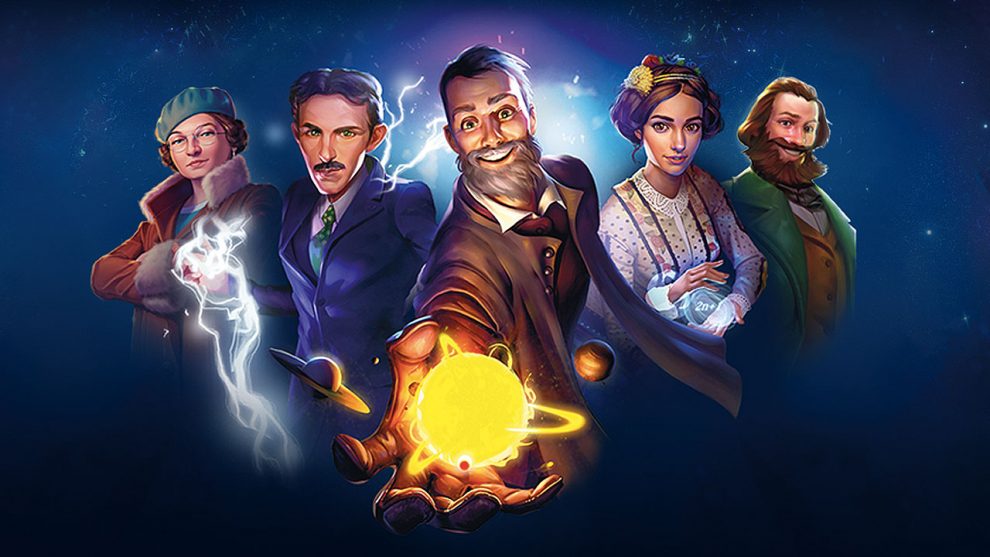

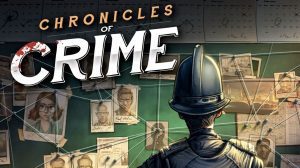

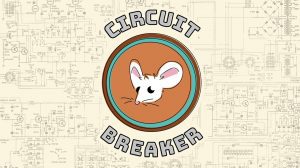




Add Comment